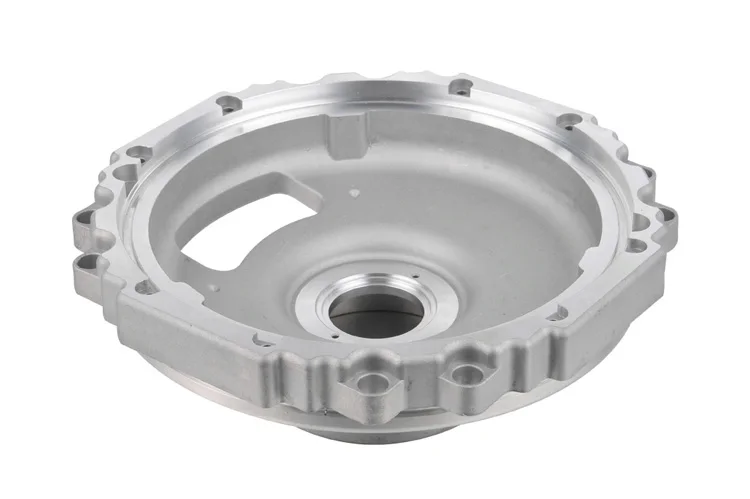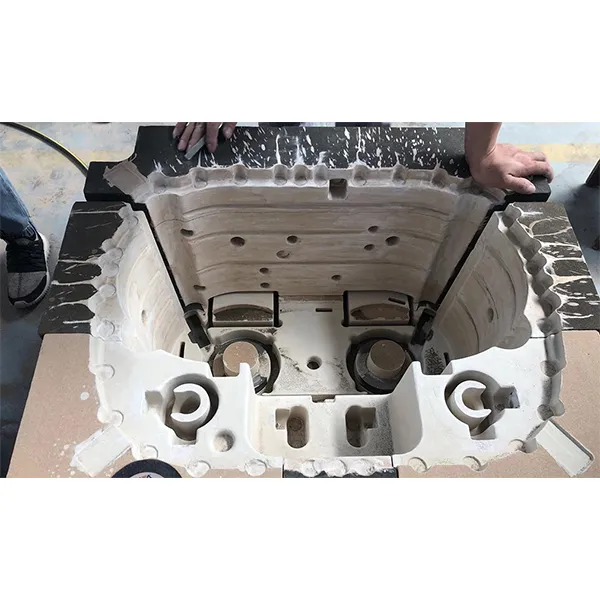Aluminum casting and its role in engineering advancements
Exactly How Light Weight Aluminum Foundries Contribute to Various Industries: A Thorough Overview
Light weight aluminum shops function as essential distributors across several fields, including vehicle, aerospace, construction, and electronics. They generate components that are not only lightweight yet likewise durable, improving the performance of numerous items. With sophisticated spreading strategies and a commitment to sustainability, these shops are adapting to satisfy advancing industry demands. As they innovate, the effect of aluminum spreadings on various applications raises essential concerns about the future of manufacturing. What exists in advance for this important industry?
The Duty of Aluminum Foundries in the Automotive Industry
As the automobile market significantly embraces light-weight products to boost gas effectiveness and efficiency, light weight aluminum foundries play an essential function in this evolution. These centers specialize in the manufacturing of light weight aluminum spreadings, which are important elements in contemporary automobiles. By giving high-strength, light-weight components, light weight aluminum foundries allow producers to lower the overall weight of cars, inevitably bring about boosted gas economy and reduced exhausts.
Light weight aluminum's resistance to rust additionally improves car durability, making it an appealing selection for automakers. Foundries utilize sophisticated strategies such as die spreading and sand spreading to develop elaborate and accurate components, making sure that they satisfy strict industry criteria. Additionally, the ability to reuse aluminum efficiently adds to a more sustainable production procedure. As the automobile market proceeds to introduce, light weight aluminum shops will certainly continue to be crucial in providing the products needed for the following generation of automobiles, sustaining both efficiency and environmental objectives.

Aerospace Applications of Aluminum Castings
Light weight aluminum castings are indispensable to the aerospace industry, supplying a combination of light-weight stamina and sturdiness that is crucial for airplane efficiency. These castings are used in numerous components, such as engine parts, structural frameworks, and touchdown gear, where weight reduction is important for fuel performance and general safety. The versatility of light weight aluminum enables for complicated geometries that boost aerodynamic efficiency while preserving architectural honesty.
In addition, innovations in casting modern technologies have actually boosted the precision and surface finish of aluminum parts, reducing the demand for substantial post-processing. This efficiency not only increases manufacturing timelines but also lowers prices, making light weight aluminum an appealing choice for producers. The corrosion resistance of aluminum warranties long life and dependability in severe operating environments, additionally developing its duty in aerospace applications. As the market evolves, aluminum spreadings remain to be a vital material, driving development and supporting the development of next-generation aircraft.
Building And Construction Sector Advancements With Aluminum
The building and construction market has significantly taken on aluminum as a result of its lightweight residential properties and adaptability, paralleling its successful applications in aerospace. Advancements in aluminum design have actually brought about more powerful, a lot more effective structures, allowing designers and building contractors to check out brand-new opportunities. The product's resistance to corrosion and reduced maintenance requires make it especially appealing for both property and commercial tasks.
Light weight aluminum's adaptability facilitates the development of intricate layouts, enabling visual improvements that were previously difficult with traditional materials. Prefabrication techniques have likewise progressed, utilizing aluminum to lower construction time and prices substantially. Additionally, the power effectiveness of light weight aluminum systems-- such as window frameworks and roof-- adds to sustainable building practices, aligning with modern-day ecological standards. As the building and construction sector proceeds to accept these developments, light weight aluminum's duty is anticipated to broaden, driving more development and adding to the growth of durable facilities.
Electronics and the Need for Lightweight Light Weight Aluminum Components
With the quick improvement of technology, the demand for light-weight light weight aluminum parts in the electronic devices field has surged. As gadgets come to be much more small and portable, suppliers look for products that use both sturdiness and weight reduction. Aluminum, with its outstanding strength-to-weight ratio, has actually become a recommended selection for elements such as housings, warm sinks, and architectural assistances.
The use of light weight aluminum not just enhances item performance yet likewise adds to energy effectiveness, as lighter devices need much less power during operation. In addition, light weight aluminum's exceptional conductivity makes it excellent for digital applications, making certain efficient heat dissipation and minimizing the risk of getting too hot.
As consumer preferences shift in the direction of smooth and light-weight devices, light weight aluminum foundries play an essential duty in fulfilling the advancing demands of the electronic devices market (aluminum casting). Their ability to produce exact and high-grade light weight aluminum elements supports innovation, making it possible for internet manufacturers to push the boundaries of layout and performance
Sustainable Practices in Aluminum Foundries
As the electronic devices market progressively prioritizes sustainability, light weight aluminum factories are adapting their practices to align with these ecological objectives. Lots of factories are applying reusing programs that reclaim aluminum scrap, greatly minimizing the need for resources and minimizing waste. By using energy-efficient modern technologies, these facilities are lowering their carbon impact; for example, utilizing electrical heaters instead of standard gas-fired ones can lead to significant energy savings.
Furthermore, light weight aluminum shops are buying water preservation actions, such as closed-loop systems that recycle water utilized in cooling processes. These practices not just reduced water usage but likewise minimize the environmental effect connected with wastewater discharge. Additionally, lots of factories are discovering renewable resource sources, such as solar and wind power, to satisfy their energy needs sustainably. Via these campaigns, aluminum factories exemplify a dedication to environmental stewardship while continuing to meet the demands of the electronics market.
Future Fads in Aluminum Foundry Technologies
Arising modern technologies are positioned to transform light weight aluminum shops, enhancing efficiency and product quality while progressing sustainability efforts. Developments such as synthetic knowledge and artificial intelligence are anticipated to enhance manufacturing procedures by forecasting equipment failures and boosting source allocation. The integration of innovative robotics will certainly improve procedures, minimizing labor costs and reducing human error.
Additive production, or 3D printing, is likewise acquiring grip, enabling the manufacturing of you can try these out intricate geometries that were formerly unattainable with typical methods. This change can cause considerable material cost savings and decreased waste. Additionally, smart foundries using IoT (Web of Things) modern technologies will certainly make it possible for real-time tracking and data evaluation, cultivating positive decision-making.
Finally, the fostering of cleaner melting modern technologies and reusing strategies will certainly better reduce the ecological impact of light weight aluminum factories, making them more sustainable. Jointly, these trends signal a future where aluminum shops can operate with higher performance and obligation.
Frequently Asked Inquiries
What Are the Environmental Effects of Aluminum Foundries?

How Do Foundries Ensure Quality Control in Light Weight Aluminum Casting?
Factories assure quality assurance in light weight aluminum spreading by applying strenuous assessment procedures, making use of sophisticated modern technology, performing routine product testing, and sticking to sector requirements, consequently maintaining consistency and reliability in their completed items. Aluminum Foundry.
What Is the Ordinary Life Expectancy of Light Weight Aluminum Cast Parts?
The average life-span of aluminum actors parts typically varies from 10 to half a century, relying on elements such as ecological conditions, usage, and maintenance. Correct care can significantly enhance their longevity and performance over time.
Just How Are Light Weight Aluminum Alloys Selected for Particular Applications?
Aluminum alloys are selected based upon variables such as stamina, corrosion resistance, weight, and thermal conductivity. Engineers evaluate the details needs of applications to determine the most appropriate alloy for best efficiency and sturdiness.
What Are the Safety And Security Laws for Light Weight Aluminum Shop Employees?
Safety policies for light weight aluminum foundry employees consist of individual protective equipment mandates, air flow requirements, exposure limits to unsafe products, and procedures for taking care of liquified steel. Compliance assurances employee safety and security and lessens wellness dangers connected with factory procedures.
As the auto industry progressively welcomes light-weight products to enhance gas performance and efficiency, light weight aluminum shops play a vital function in this development. As customer choices change in the direction of streamlined and light-weight gizmos, light weight aluminum shops play an important function in satisfying the evolving demands of the electronic devices market. As the electronics industry significantly focuses on sustainability, aluminum factories are adjusting their methods to align with these ecological important site objectives. Numerous foundries are applying recycling programs that recover aluminum scrap, significantly reducing the need for raw materials and minimizing waste. Safety guidelines for light weight aluminum factory workers consist of individual safety devices requireds, air flow demands, direct exposure limits to hazardous products, and procedures for taking care of liquified steel.